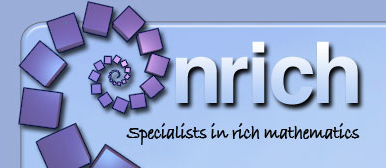If you're worried that a mathematics degree might limit your career options, then there couldn't be a better person to talk to than Steve Hewson. His varied career has seen him investigating the mysteries of the Universe, working on the trading floor of a major investment bank, writing a book, and inspiring kids in the maths classroom. Currently he develops content for NRICH, a website that provides free mathematical enrichment materials for learners of all ages, and a sister project of Plus.

Steve Hewson
There's a lot to explore in this interview, but let's start at the beginning: how did Steve get into maths in the first place? "I'm from a very non-mathematical and non-scientific family," he says. "But when I was five I found the Readers Digest Atlas of the World and just inside the front cover there was this great picture of the solar system, it was really fascinating and really caught my interest." At the age of eight or so he came across the concept of black holes and curved spacetime in a book on the Universe, and this made up his mind: he was going to do a degree in general relativity. "I plugged away slowly towards this goal, even choosing French at age thirteen, because I knew that you had to have French to get into Cambridge — Cambridge is the best place to do maths, which is what you need to do general relativity. So I was quite driven, from quite a young age."
At school Steve found maths easy, but rather boring and routine compared to other subjects like chemistry. "But I'm glad I stuck it out, because the maths I did at university proved to be light years more interesting than the maths I'd done at school — I really enjoyed my maths degree at Cambridge." After completing that degree, Steve did a further one year maths course at Cambridge, a dreaded Masters equivalent known as Part Three. Then, finally, he was where he had wanted to get: he started a PhD researching black holes, which later turned into string theory, and then led to a research fellowship, also at Cambridge.
Black hole maths
Black holes are a matter of physics, of course, so how does the maths come in? "The way to understand spacetime is, loosely speaking, as a curved surface, something like a football or some other curved object. A black hole is a place where the surface is so warped that it actually punctures. So it's all about geometry, gradients and tangents and so on."

The mysteries of the solar system inspired Steve to study general relativity and later string theory. Image courtesy NASA JPL.
Steve's work was an extension of the kind of geometry we're used to, where the underlying space consists of three spatial dimensions and one time dimension. These are the only dimensions we can perceive, but string theory conjectures that there may be more, typically nine spatial dimensions and one time dimension. String theory is a mathematical model of physical reality, which arose from the fact that the two most effective physical theories we have, general relativity and quantum mechanics, don't quite fit together. We need a unifying theory, and string theory, though completely hypothetical and untested, is an attempt at just that. But without the extra dimensions the mathematics underlying string theory simply won't add up. The reason we can't see them, so the theory goes, is that they're curled up incredibly tightly — they're too small for us to notice. (You can read more about string theory in the Plus articles String theory: From Newton to Einstein and beyond and Tying it all up.)
But Steve's work considered something still more exotic than that. "I was actually working on a model with ten spatial dimensions and two time dimensions," he explains, "trying to work out which geometries and symmetries with two time directions were compatible with physics as it was understood at the time. My motivating factor for this work was primarily one of mathematical beauty, rather than any physical consideration: 10+2 just seemed likely to me to have the right level of structure from which more standard string theories might naturally emerge. What was interesting about looking at two-time physics was that many standard concepts, which usually implicitly assume one-time, needed re-thinking". Steve admits that two-time physics was a bit of a fringe topic: "There was only me and a couple of other people working on it. But I've never been mainstream and it wasn't me to follow the trend. Two-time physics was fringe and still is, but I'm convinced that it will play a part in the final picture."
Money maths
Steve's years as a research mathematician were very intense and required a lot of focus, so after a few years he felt like widening his horizon. He went to work in the City for a big investment bank in Canary Wharf. "I saw an ad in the paper and decided to apply, thinking, if nothing else, that it would give me some practice in doing job interviews. But I ended up getting the job. It was unexpected, but I thought that I had to take this opportunity."
Steve was what's known as a quant, short for quantitative analyst, using mathematical techniques to model interest rates. The City environment is of course very different from the academic world. "The pace in the bank was really exciting. Whereas in research you can go through a day without really talking to anybody, in the City things are much more lively, and people are really bright." Even the maths, being driven by practical problems, moves at a much faster pace. "The turnover of problems is on the whole much quicker and I really enjoyed having an idea, implementing it, and seeing the results in a few weeks' time, rather than a few months' time or even longer, as is the case with pure research. It's a real buzz to see 'your' maths being used to do some pricing — and it's scary as well. In two-time physics there's no real downside: it's ok to make a mistake because no one relies on it. But in banking it's very different, and that's really exciting."

A different pace: International banks at Canary Wharf.
Much of Steve's work at the bank revolved around the now infamous derivatives. These are contracts whose values depend on the future value of certain underlying variables, such as the price of a share or a barrel of oil. The dependency detailed in the contract can be phenomenally complicated, but a standard example of a derivative is a call option, which allows you to buy a certain commodity at some fixed point in the future at a price you fix today. Why might this sort of thing be useful? As an example, consider the value of airline fuel. This changes significantly from day to day and an airline selling tickets far in advance might need to insure itself against the risk that fuel prices rocket in the time between the sale of a ticket and the time when it needs the fuel for the actual flight. To do this, it can buy a call option on airline fuel: for an upfront fee it can buy a contract to fix the future price. In this example, the option is to buy a physical object, known as a commodity in the trade. However, you can also make options on more abstract quantities such as the price of bundles of shares, share indices, inflation, foreign exchange rates or even interest rates themselves.
Inventing derivatives is one thing. The problem is then to work out how much such derivatives should cost, and this is where the maths comes in. Rather fascinatingly, it turns out that there is often only a single possible price for a derivative, but to understand why this is so, you need probability theory and statistics to cope with the uncertainty of future events, along with calculus and differential equations to deal with the rates of change. The area of maths which incorporates both is known as stochastic calculus and that's what Steve was dealing with a lot of the time. (You can read more about derivatives in the Plus articles A risky business: how to price derivatives and Is maths to blame?)
But Steve's mathematical expertise was essential in other ways, too. "In finance you also need general mathematical problem solving skills. If you have a messy financial problem, the skill is to work out what the important quantitative features are, and then work out what maths you need to solve the problem." In fact, these problem solving skills are so essential for the job that most banks require quants to have a PhD in subjects like maths or physics. "It's the skills of tenacity and problem solving that are critical to do the job well. If I had gone into banking as a graduate fresh from university, things in the quant world would have been too complicated for me to understand. The main transferable skill from my years of study and research was the ability to think and solve really hard problems."
Maths education
Steve got out of the financial world long before the current crisis hit. "For me life is about experiencing many things, and I felt it was time to move on from the tough world of banking and do something new. So in 2004 I decided to become a teacher." True to his word, Steve soon found himself back in Cambridge doing a PGCE (postgraduate certificate in education). A year later he was in the classroom as a newly qualified maths teacher, faced with a challenge harder than anything else he'd done before. "Teaching is, in many ways, a lot harder than academic research or work on the trading floor. I completely admire the professional dedication of teachers."
Steve did enjoy planning his lessons and thinking of inspiring materials to motivate students, many of whom dislike maths and can't see the point of studying it. He also found that his own varied career inspired the kids, and that his experience in giving short and to-the-point explanations of his work to both his family members and time-pressured bankers worked wonders with the weaker students. But what he found challenging (apart from the mountains of admin he was required to do) was dealing with difficult behaviour. "You've got 30 kids in the classroom with a whole range of issues. Before learning can begin you need to build a rapport and a safe learning environment with them. If the kids are troubled, then this can take quite some time, and that's when the worst disruptive behaviour starts. To deal with disruptive behaviour every day is really draining, too much so for me!" As a result, Steve left teaching two years later, but feels that he has taken away a great deal from the experience. "For me, who had been a cerebral person all my life, it was a good refreshing view of other aspects of life."

NRICH is a mathematics enrichment website containing thousands of resources for teachers and students.
In his current job Steve has managed to retain what he liked most about teaching: making maths interesting and inspiring students to study it. He works for the NRICH website, a sister project of Plus, based at the University of Cambridge and, like Plus, belonging to the Millennium Mathematics Project. The NRICH site contains thousands of mathematical problems and articles, aimed at learners of all ages and levels, and completely free of charge.
"The main thrust of my job is to develop interesting problems for students aged 16 to 19, which is A level, but also first year university," says Steve. "Second to that is going to schools and universities, talking to teachers and students, and demonstrating the materials, and getting ideas for new problems. At the moment I'm developing lots of science-based problems for NRICH, problems involving physics, biology and chemistry, rather than just maths. It's good fun and an interesting challenge, because there are many new things to quickly get my head around."

Steve's book A mathematical bridge.
There's also another project to do with education, dating back to Steve's time as a researcher, that has recently come to fruition. It's a book, called A mathematical bridge, which he has written to ease the transition from school to university maths. "I found this transition very difficult. While I was at school I got my top grades, but I hadn't been prepared for the level of thinking required at university. I found the first term at university academically incredibly difficult: basically, I went from getting 100% to getting 0%. I worked through it and was ok in the end, but I became very aware of the fact that good schooling makes all the difference to how you start your degree." Steve's book is a textbook, but it's not written in the usual dry textbook style. Rather, it introduces the topics studied at university in a way that is accessible and intuitive.
Steve feels that the maths teaching at school often leaves a lot to be desired, particularly when it comes to making the best of students' potential. "Of course, there are many outstanding schools and teachers, but even in very good schools the very best students are often neglected, because there is a feeling that if they get all As, then they've succeeded. But if their ability level is so much higher than this grade threshold, then they haven't succeeded at all, they've actually coasted or underperformed. This is why NRICH is so good. It empowers teachers to give very rich lessons to all students, and also empowers self-motivated students to pursue their interests further. Being on an enrichment programme like NRICH is ideal for me, because it enables me to put some of my ideas into action quickly and to a wide audience."
For the moment, Steve is not planning any sudden career changes, or at least he's unwilling to speculate what they might be. But what advice would he give to people who'd like to go into any of the careers he has worked in? "My top bit of advice is that you want to practice your problem solving skills. Problem solving means to take something that's open and challenging and requires thought, and to train your mind to think its way through the difficulties. I suppose that the one thing that connects all my activities is a skill at solving problems. So a new task can come along, whatever it may be, and I am relatively good at working out how to do it. In addition to developing problem solving skills, I'd say you should learn how to use and program computers, using a language like, say, Visual Basic Express. It doesn't really matter what programming language it is, but it's important to learn how programming works, because whatever you end up doing with your maths, you will probably need it."
About the authors
Marianne Freiberger and Rachel Thomas are Editors of Plus.